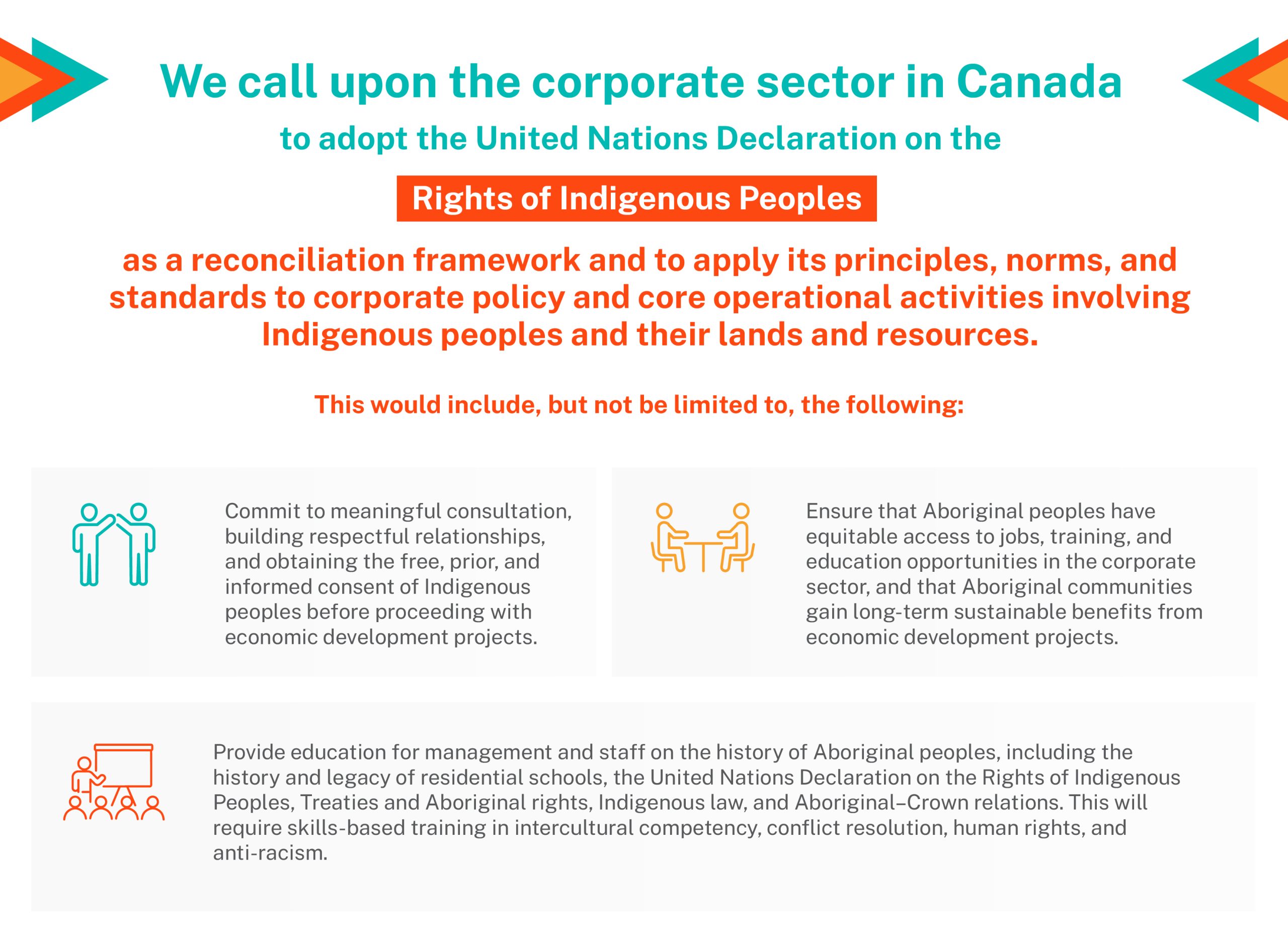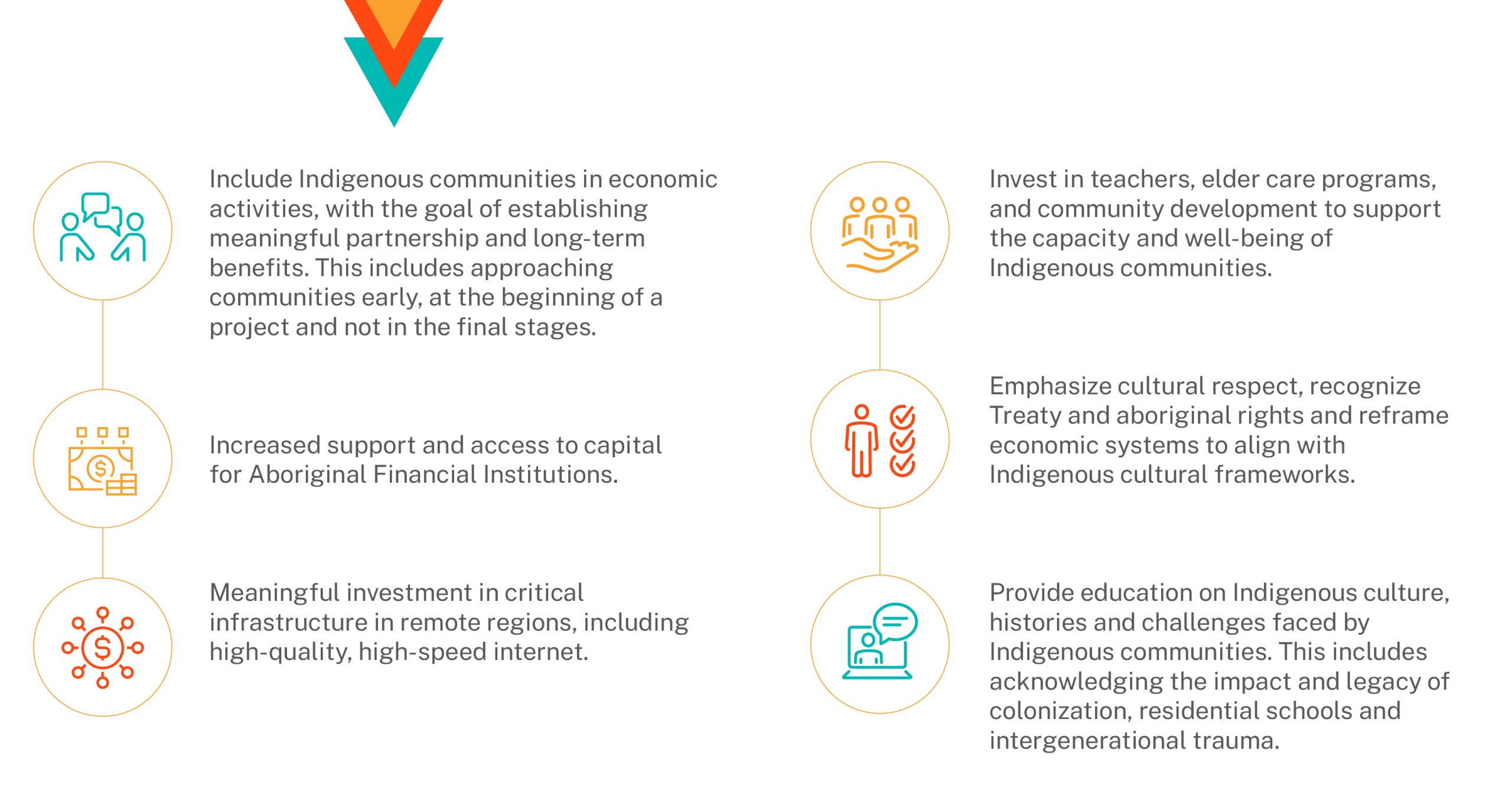Blog /
Policy Matters: Economic Reconciliation
Policy Matters: Economic Reconciliation
June marks National Indigenous History Month in Canada, a time to recognize the rich history, heritage, resilience and diversity of First Nations, Inuit and Métis peoples. Learning about and honouring Indigenous Peoples in Canada is also an important part of Canada’s reconciliation journey.


June marks National Indigenous History Month in Canada, a time to recognize the rich history, heritage, resilience and diversity of First Nations, Inuit and Métis peoples. Learning about and honouring Indigenous Peoples in Canada is also an important part of Canada’s reconciliation journey.
We are all responsible for helping to build a renewed relationship with Indigenous Peoples based on the recognition of rights, respect and partnership. The business community has a major role to play, especially when it comes to economic reconciliation.

THE POLICY PROBLEM
For centuries, the economic vitality of Indigenous Peoples in Canada was actively and purposefully suppressed. This legacy of colonization has led to a society where Indigenous people continue to be at a disadvantage and cannot fully share and thrive in the economy.
What exactly can that look like?
- Indigenous individuals often find themselves confined to minimum wage jobs, with limited opportunities for advancement or recognition of their potential.
- Limited access to financial institutions like banks (especially on reserves), and difficulties in securing loans or financial assistance. This is especially problematic for Indigenous entrepreneurs.
- Lack of business networks and mentorship.
- Challenges accessing quality education and training.
- Current and historic laws and policies that make it difficult for Indigenous populations to build sustainable economies and accumulate wealth. A good example is the historical ban on Indigenous land ownership.
- Lack of basic necessities in many communities, including reliable high-speed internet, transportation infrastructure like roads, and even water and electricity.
- Racism and discrimination towards Indigenous people and their businesses.
These are just some of the MANY economic obstacles faced by Indigenous Peoples in Canada, and it’s our responsibility as the business community to help address them.
Thanks to the work of the Truth and Reconciliation Commission of Canada (TRCC), which published their final report in 2015, we have a way forward – and we need to move faster.
The path to economic reconciliation isn’t easy, but after eight years, it’s clear we need to be working harder collectively to make progress.

BUSINESS AND RECONCILIATION
In 2015, the Truth and Reconciliation Commission of Canada presented a final report that included 94 “Calls to Action” designed to advance reconciliation between Canadians and Indigenous Peoples.
Call #92 is specifically directed at the business community:


POLICY SOLUTIONS
Using this framework, there are a number of government and corporate policies that can help advance economic reconciliation. Here are just a few specific examples:


WHAT’S NEXT?
Economic reconciliation is complex, and while policy solutions may seem far-removed in the realm of politics and government bureaucracy, there is no shortage of tangible actions businesses of all sizes and sectors can take.
For Employers
- Identify and create opportunities for mentorship programs that can support Indigenous employees and foster their professional growth.
- Establish committees or mechanisms to create culturally safe work environments that accommodate the diverse needs and backgrounds of Indigenous employees.
- Recognize that the Indigenous community is not homogenous. Each Indigenous nation, reserve or community has different traditions and tailored approaches to address their specific needs and challenges are necessary.
- Encourage the development of ideas and initiatives that promote collaboration and modify training programs to facilitate the hiring and inclusion of Indigenous individuals.
- Recognize and support initiatives like Orange Shirt Day to raise awareness about the experiences and challenges faced by Indigenous communities.
- Address and eliminate abusive behaviours and practices in the workplace.
For Chambers of Commerce and Boards of Trade
- Actively participate in community events. This fosters engagement and discussions to establish long-term relationships with Indigenous communities.
- Establish partnerships with local Friendship Centres and collaborate with Indigenous communities to create cohorts and mastermind groups that can share information.
- Promote resources and education opportunities for Indigenous people and businesses and share information through social media platforms with neighbouring communities to help increase reach.
- Increase Indigenous representation on boards of directors.
- Consider hosting or providing workshops or coaching for Indigenous businesses.
- As a business hub, help foster business opportunities by highlighting Indigenous business and community success stories.
Glossary
Here are a few terms to better understand the conversation around economic reconciliation:
Aboriginal Financial Institution: Aboriginal Financial Institutions (AFIs) are autonomous, Indigenous-controlled, community-based financial organizations. AFIs provide developmental lending, business financing and support services to First Nations, Métis, and Inuit businesses in all provinces and territories.
Economic Reconciliation: The process of making economic amends for historical injustices to Indigenous Peoples. It aims to create meaningful partnerships and mutually beneficial opportunities based on a holistic, values-driven approach to attaining community economic prosperity.
Reconciliation: Establishing and maintaining a mutually respectful relationship between Aboriginal and non-Aboriginal peoples in Canada. For that to happen, there has to be awareness of the past, acknowledgement of the harm that has been inflicted, atonement for causes, and action to change behavior.
Self-determination: The right of Indigenous people to determine their political status and freely pursue their economic, social and cultural development, and to dispose of and benefit from their wealth and natural resources. Canada is obligated to respect these right as per the United Nations Declaration on the Rights of Indigenous Peoples
Truth and Reconciliation Commission of Canada (TRCC): The Truth and Reconciliation Commission of Canada (TRC) was created through a legal settlement between Residential Schools Survivors, the Assembly of First Nations, Inuit representatives and the parties responsible for creation and operation of Residential schools: the federal government and the church bodies. The TRC’s mandate was to inform all Canadians about what happened in residential schools. They carried out extensive research, including hearing from Residential Survivors, their families, members of their communities, former staff of residential schools and others. The TRC prepared a comprehensive report on the policies and operations of the schools and their lasting impacts. The final report included Ten Principles for Reconciliation and 94 Calls to Action that speak to all sectors of Canadian society.

RESOURCES
Reports
Tools
Websites

ACKNOWLEDGEMENT
We’d like to thank the Indigenous voices and leadership in the Canadian Chamber Network who informed the content and recommendations included in this edition of Policy Matters.
Related News

Employee Education is a Critical Defence Against Cyber Attacks

How Your Organization Can Quantify and Reduce Your Cyber Risk




